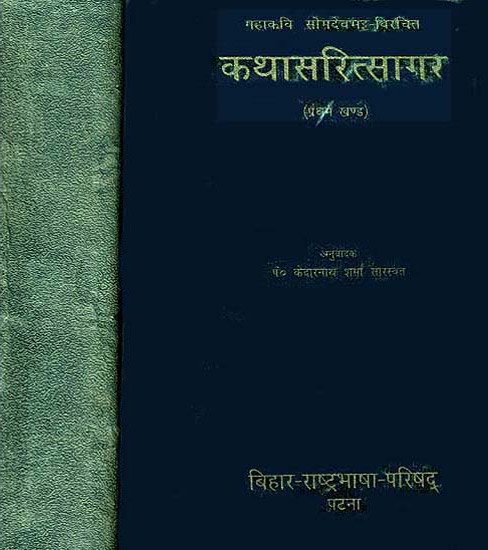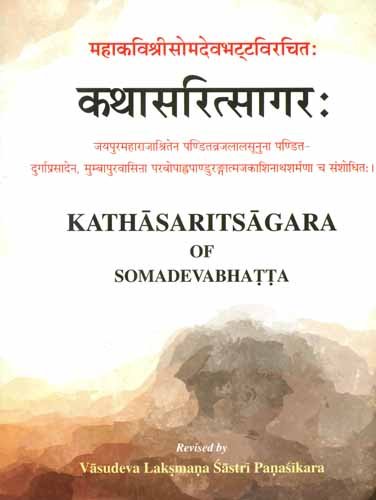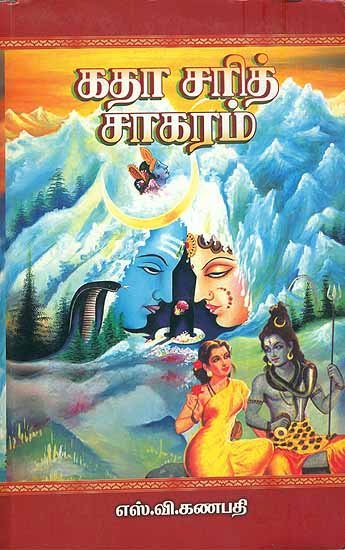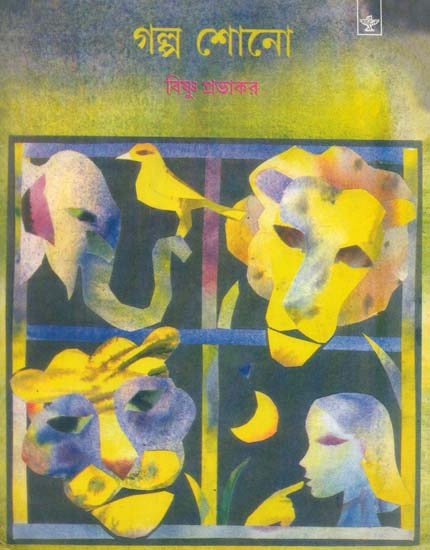Kathasaritsagara [sanskrit]
by C. H. Tawney | 2014 | 226,424 words | ISBN-13: 9789350501351
The Sanskrit edition of the Kathasaritsagara referencing the English translation and grammatical analysis. Written by Somadeva and dating from the 12th century, the Kathasaritsagara (or Katha-sarit-sagara) represents an epic legend narrating the adventures of Naravahanadatta as he strives to become the destined emperor of the Vidyadharas. Alternative titles: (Kathāsaritsāgara, कथासरित्सागर, Kathā-sarit-sāgara)
Verse 7.8.225
तस्मिन् स्नात्वा हिमगिरिसुताकान्तम् अभ्यर्च्य भक्त्या कृत्वाहारं सुरभिमधुरास्वादहृद्यैः फलैस् तैः ।
सख्या सार्धं मृदुकिसलयास्तीर्णशय्याप्रसुप्तस् तत्तीरे तां रजनिमनयस्तो ऽत्र वत्सेशसूनुः ॥ २२३ ॥
tasmin snātvā himagirisutākāntam abhyarcya bhaktyā kṛtvāhāraṃ surabhimadhurāsvādahṛdyaiḥ phalais taiḥ |
sakhyā sārdhaṃ mṛdukisalayāstīrṇaśayyāprasuptas tattīre tāṃ rajanimanayasto 'tra vatseśasūnuḥ || 223 ||
The English translation of Kathasaritsagara Verse 7.8.225 is contained in the book The Ocean of Story by C.H. Tawney. This book is available online or you could buy the latest edition:
Read online Buy now! The English translation by C.H. Tawney (2014)
Glossary of Sanskrit terms
Note: This extracts Sanskrit terms and links to English definitions from the glossary, based on an experimental segmentation of verse (7.8.225). Some terms could be superfluous while some might not be mentioned. Click on the word to show English definitions.
Tad, Snatva, Himagirisutakanta, Abhyarcya, Bhaktya, Bhakti, Kritva, Kritvan, Ahara, Surabhi, Adhura, Ada, Hridya, Phala, Sakhi, Sardham, Sardha, Mridu, Kisalaya, Astirna, Shayya, Shayi, Prasupta, Tat, Tira, Rajani, Anaya, Ani, Tas, Atra, Vatsesha, Sunu,
Analysis of Sanskrit grammar
Note: this is an experimental feature and only shows the first possible analysis of the Sanskrit text (Kathasaritsagara Verse 7.8.225). If the system was successful in segmenting the sentence, you will see of which words it is made up of, generally consisting of Nouns, Pronouns, Verbs, Participles and Indeclinables. Click on the link to show all possible derivations of the word.
- Line 1: “tasmin snātvā himagirisutākāntam abhyarcya bhaktyā kṛtvāhāraṃ surabhimadhurāsvādahṛdyaiḥ phalais taiḥ ”
- tasmin -
-
tad (noun, neuter)[locative single]sa (noun, masculine)[locative single]
- snātvā* -
-
snātva (noun, masculine)[nominative plural], [vocative plural]snātvā (noun, feminine)[nominative plural], [vocative plural], [accusative plural]
- himagirisutākāntam -
-
himagirisutākānta (noun, masculine)[adverb], [accusative single]
- abhyarcya -
-
abhyarcya (noun, masculine)[compound], [vocative single]abhyarcya (noun, neuter)[compound], [vocative single]
- bhaktyā -
-
bhaktyā (indeclinable)[indeclinable]bhakti (noun, feminine)[instrumental single]
- kṛtvā -
-
kṛtvā (indeclinable)[indeclinable]kṛtvan (noun, masculine)[compound], [nominative single]kṛtvan (noun, neuter)[compound], [adverb], [nominative single], [vocative single], [accusative single]√kṛ -> kṛtvā (absolutive)[absolutive from √kṛ]√kṛ -> kṛtvā (absolutive)[absolutive from √kṛ]√kṛ -> kṛtvā (absolutive)[absolutive from √kṛ]√kṛ -> kṛtvā (absolutive)[absolutive from √kṛ]
- āhāram -
-
āhāra (noun, masculine)[adverb], [accusative single]āhāra (noun, neuter)[adverb], [nominative single], [accusative single]
- surabhim -
-
surabhi (noun, masculine)[accusative single]
- adhurāsvā -
-
adhurā (noun, feminine)[locative plural]
- āda -
-
āda (noun, masculine)[compound], [vocative single]āda (noun, neuter)[compound], [vocative single]√ad (verb class 2)[perfect active first single], [perfect active second plural], [perfect active third single]
- hṛdyaiḥ -
-
hṛdya (noun, masculine)[instrumental plural]hṛdya (noun, neuter)[instrumental plural]
- phalais -
-
phala (noun, masculine)[instrumental plural]phala (noun, neuter)[instrumental plural]
- taiḥ -
-
ta (noun, masculine)[instrumental plural]ta (noun, neuter)[instrumental plural]tad (noun, neuter)[instrumental plural]sa (noun, masculine)[instrumental plural]
- Line 2: “sakhyā sārdhaṃ mṛdukisalayāstīrṇaśayyāprasuptas tattīre tāṃ rajanimanayasto 'tra vatseśasūnuḥ ”
- sakhyā -
-
sakhi (noun, masculine)[instrumental single]sakhī (noun, feminine)[instrumental single]
- sārdham -
-
sārdham (indeclinable)[indeclinable]sārdha (noun, masculine)[adverb], [accusative single]sārdha (noun, neuter)[adverb], [nominative single], [accusative single]sārdhā (noun, feminine)[adverb]
- mṛdu -
-
mṛdu (noun, masculine)[compound], [adverb]mṛdu (noun, neuter)[compound], [adverb], [nominative single], [vocative single], [accusative single]mṛdū (noun, feminine)[adverb], [vocative single]
- kisalayā -
-
kisalaya (noun, neuter)[compound], [vocative single]
- āstīrṇa -
-
āstīrṇa (noun, masculine)[compound], [vocative single]āstīrṇa (noun, neuter)[compound], [vocative single]
- śayyā -
-
śayyā (noun, feminine)[nominative single]śayi (noun, feminine)[instrumental single]
- prasuptas -
-
prasupta (noun, masculine)[nominative single]
- tat -
-
tat (indeclinable correlative)[indeclinable correlative]tad (noun, neuter)[compound], [nominative single], [accusative single]
- tīre -
-
tīra (noun, masculine)[locative single]tīra (noun, neuter)[nominative dual], [vocative dual], [accusative dual], [locative single]
- tām -
-
tā (noun, feminine)[accusative single]sā (noun, feminine)[accusative single]
- rajanim -
-
rajani (noun, feminine)[accusative single]
- anayas -
-
anaya (noun, masculine)[nominative single]ani (noun, masculine)[nominative plural], [vocative plural]√nay (verb class 1)[imperfect active second single]√nī (verb class 1)[imperfect active second single]
- to' -
-
tas (noun, masculine)[compound], [vocative single]tas (noun, neuter)[compound], [nominative single], [vocative single], [accusative single]ta (noun, masculine)[nominative single]
- atra -
-
atra (indeclinable adverb)[indeclinable adverb]atra (noun, masculine)[compound], [vocative single]atra (noun, neuter)[compound], [vocative single]
- vatseśa -
-
vatseśa (noun, masculine)[compound], [vocative single]
- sūnuḥ -
-
sūnu (noun, feminine)[nominative single]sūnu (noun, masculine)[nominative single]
Other editions:
Also see the following editions of the Sanskrit text or (alternative) English translations of the Kathasaritsagara Verse 7.8.225
Kathasaritsagar
by Kedarnath Sharma Saraswat (2005)
The Only Edition with the Sanskrit Text and its Hindi Translation (An Old and Rare Book) Set of 3 Vol.
Buy now!
Kathasaritsagara of Somadeva Bhatta (Sanskrit Text Only)
by Vasudeva Laksmana Sastri (2013)
Katha Sarit Sagar in Marathi
by H. A Bhave (1995)
Set of 5 Volumes; Published by Varada Books, Pune. 2256 pages (Throughout B/W Illustrations).
Buy now!
Katha Sarit Sagara (Tamil)
by S. V. Ganapati (எஸ். வி. கணபதி) (2014)
[கதா சரித் சாகரம்] Published by Alliance Publications.
Buy now!
Galpa Shono
by Abhijit Chattopadhyay (2014)
[গল্প শোনো] Galpa Shono: Bengali Translation of 'Suno Kahani From Katha Sarit Sagar'; 9788126015436; Published by Sahitya Akademi, Delhi.
Buy now!Preview of verse 7.8.225 in Bengali sript:
তস্মিন্ স্নাত্বা হিমগিরিসুতাকান্তম্ অভ্যর্চ্য ভক্ত্যা কৃত্বাহারং সুরভিমধুরাস্বাদহৃদ্যৈঃ ফলৈস্ তৈঃ ।
সখ্যা সার্ধং মৃদুকিসলযাস্তীর্ণশয্যাপ্রসুপ্তস্ তত্তীরে তাং রজনিমনযস্তো ঽত্র বত্সেশসূনুঃ ॥ ২২৩ ॥
![Kathasaritsagara [sanskrit] - book cover](/uploads/a/Katha-Sarit-Sagara.jpg)




